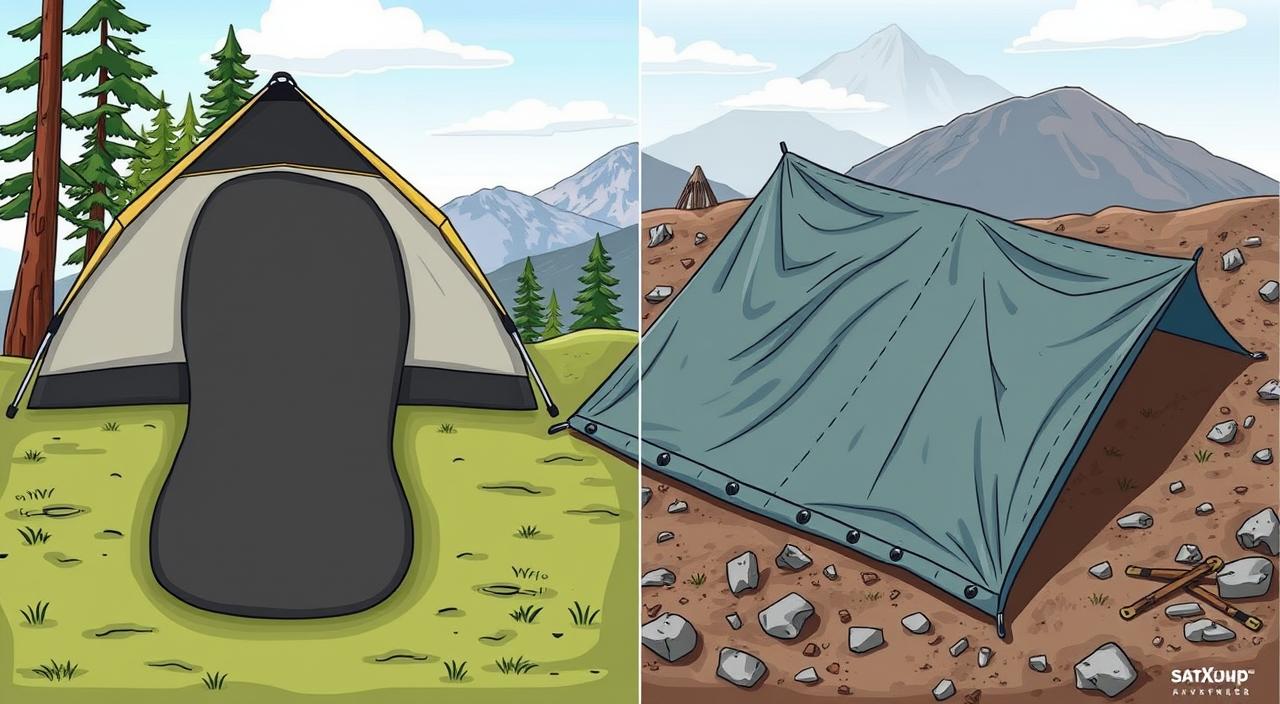
Disclaimer: This post may contain affiliate links. As an Amazon Associate, we earn from qualifying purchases.
Ever wondered what’s hiding in your camping tent? A musty smell might seem minor, but it can hint at bigger problems. We’re here to show you how to clean a musty tent. Learn how to get rid of odors and make your gear smell fresh again. With the right care and cleaning tips, your tent will be ready for your next adventure.
Key Takeaways
- Understanding the common causes of musty odors in tents is crucial for effective cleaning.
- Airing out your tent immediately after trips can help prevent odors from returning.
- Mixing isopropyl alcohol with water can aid in removing unpleasant smells linked to PU coating breakdown.
- Using natural solutions, such as vinegar and baking soda, can be effective for deodorizing camping gear.
- Regular maintenance and proper storage are key to keeping your tent fresh for years to come.
- Consider materials and conditions, as some tents may be more susceptible to mold and mildew.
Why Does Your Tent Smell Musty?
Understanding why your tent smells musty is key to fixing the problem. Many things can cause bad smells, making camping less fun. Moisture, dirt, and sweat can make your tent smell bad. Knowing what causes these smells helps you fight them.
Common Causes of Musty Odor
Musty smells in tents come from a few main sources. These include:
- Accumulated dirt and grime from extended use.
- Trapped moisture caused by wet camping conditions.
- Organic materials like food or plant matter.
- Human perspiration that penetrates the fabric.
Dealing with these causes early can help get rid of musty smells and make your tent last longer.
The Impact of Moisture on Tent Material
Moisture in tents is a big problem. It lets mold and mildew grow, which can harm the fabric. If your tent stays wet, mildew can go deep and damage the coating. This damage can’t be fixed.
To stop musty smells, you need to do more than just clean. Keeping your tent dry and well-maintained makes camping better.
| Cause | Effects | Prevention |
|---|---|---|
| Trapped Moisture | Mold and mildew growth | Air drying after each trip |
| Dirt and Grime | Unpleasant odors | Regular cleaning |
| Sweat Accumulation | Fabric deterioration | Immediate post-trip washing |
| Organic Materials | Enticing pests | Clean before storage |
Identifying the Source of the Smell
When you notice bad smells coming from your tent, it’s key to find out why. Tents often get smelly because of dirt, mold, and mildew, and materials breaking down. Knowing these causes can help keep your camping gear smelling fresh.
Dirt and Grime Accumulation
After using your tent a lot, it can get covered in dirt and grime. This happens from outdoor activities and can make your tent smell bad. Cleaning your tent regularly helps get rid of dirt and stops smells from building up.
Mold and Mildew Development
Moisture inside the tent can lead to mold and mildew. This comes from your breath, body heat, rain, or damp ground. Mold and mildew make a musty smell that can ruin your camping trip. Keeping an eye on moisture levels can help keep your tent smelling good.
Chemical Breakdown of Tent Materials
Tents have protective coatings that can break down over time. This can make them smell bad. Knowing how to take care of your tent can stop these smells and make camping more enjoyable.
How to Clean a Musty Tent
Cleaning a musty tent is key to keeping it in good shape and making camping enjoyable. Many tents get smelly from mold and mildew, especially in damp places. By following the right steps, you can make your tent smell fresh and welcoming.
Initial Steps: Airing Out the Tent
Start by letting your tent breathe fresh air. Set it up outside or hang it where it gets lots of sunlight. This helps get rid of bad smells. Let the tent air out for a few hours, especially if you think there’s mold or mildew.
Recommended Cleaning Solutions
If airing out doesn’t work, try gentle cleaning methods. Stay away from strong chemicals that can harm your tent’s protective layers. Here are some good cleaning options:
- For Spot Cleaning: Mix ¼ cup of white vinegar with one cup of warm water for a mild solution. Or, use one cup of lemon juice with one cup of salt in one gallon of hot water to clean stains.
- Hand Washing: Use soft brushes to gently clean the tent with the solution. This is safe and won’t damage the fabric.
- For Deeper Odor Removal: Try Revivex Pro Cleaner at about 2 fl oz per tub of warm water, or Revivex Odor Eliminator at 1 fl oz per gallon of water.
Avoid using bleach because it can make the tent fabric weak. After cleaning, rinse the tent well to get rid of any cleaning residue. Let it dry for 6-8 hours before using it again to avoid moisture problems later.
Effective Tent Deodorizing Methods
After an adventure, your tent might not smell great. Using the right methods can make it smell nice again. You can try making solutions with vinegar and lemon juice, or use probiotic sprays made for getting rid of odors.
Using Vinegar and Lemon Juice
Vinegar and lemon juice are great for making your tent smell fresh. Mix equal parts of warm water with these ingredients in a spray bottle. Or, soak the tent in this mix for up to five minutes for a deeper clean.
A quick spray on the smelly spots can get rid of the odor. Your tent will smell fresh and clean.
Probiotic Sprays for Odor Elimination
For a modern solution, try probiotic sprays like Homebiotic Probiotic Spray. These sprays work on a molecular level to remove odors. Just spray it on as needed for a fresh smell that lasts.

Reviving Smelly Outdoor Tents
Reviving smelly tents can be done with spot and deep cleaning methods. Knowing the right techniques helps get rid of bad smells and keeps your gear in great shape.
Spot Cleaning Techniques
Spot cleaning focuses on specific areas with mildew or odors. It’s great for tackling local issues without a full wash. You’ll need a few key items to start:
- Sponge or soft cloth
- Toothbrush for scrubbing
- Mild detergent or specialized products like Nikwax Tent Cleaner
- Mineral oil (optional for additional treatment)
Start with a mix of 2 fl oz of Revivex Pro Cleaner in water. Use a sponge or toothbrush to clean the affected spots. This cleaning takes about 30 minutes.
Let the tent air dry completely, ideally for 6-8 hours. Make sure humidity is below 60% and temperatures are over 60°F.
Deep Cleaning Approaches
Deep cleaning offers a thorough way to refresh your tent. Start by soaking the tent in a soap mix of:
- 8 oz (237 mL) isopropyl alcohol
- 24 oz (710 mL) water
- 2 drops of dish soap
This soak lasts 2-3 hours. Rinse well and let the tent air dry for at least 24 hours. To deodorize, use 1 fl oz of Revivex Odor Eliminator per gallon of water. Spray it carefully to avoid damage. Washing and deodorizing takes about 30 minutes, but drying is key for removing odors.
These steps not only refresh your gear but also help it last longer. Regular cleaning stops bad smells and stains, making camping more enjoyable.
Prevention: Keeping Your Tent Fresh
Keeping your tent fresh is crucial for a long-lasting tent and a great camping trip. Start by maintaining your tent right after your trip to stop odors before they start. Checking your tent regularly helps keep it in top shape for future trips.
Post-Camping Inspection and Maintenance
When you get back, inspect your tent carefully. Look for any damage and make sure there’s no dirt or debris in the seams. Here are some key steps:
- Clean out any accumulated debris inside the tent.
- Check for mold or mildew, especially in any damp areas.
- Inspect the tent fabric, zippers, and poles for tears or issues.
- Ensure the tent material is completely dry before folding.
Proper Airing and Drying Techniques
Airing out your tent is key to keeping it fresh. Drying it well helps prevent odors from forming. Here are some tips for drying your tent:
- Unfold the tent in a well-ventilated area, ideally outdoors on a sunny day.
- Allow the tent to air dry for about 6-8 hours, ensuring all parts are completely dry.
- Consider using a fan or a rechargeable aroma diffuser to keep the air circulating.

In humid areas, good ventilation is a must. Proper drying helps keep your tent fresh and extends its life. Make a routine of thorough checks, cleanings, and drying to make your tent last longer.
How to Pack Up a Tent Correctly
Proper tent care is key to keeping it in good shape. Paying attention to how you pack your tent can help avoid problems later. It’s important to make sure your tent is dry before you store it. If it’s not dry, moisture can cause mold and mildew, damaging the fabric and your health.
Importance of Drying Before Storage
Before packing, let your tent air out. Make sure it’s completely dry by leaving it in a spot with good airflow or in the sun for a few hours. This step is crucial for keeping your tent in top shape. Mold and mildew come from moisture on the fabric, so drying it well is a must.
Using Moisture Absorbers in Storage
Using moisture absorbers for tents also helps keep them dry. Products like bamboo charcoal bags or silica gel packets soak up any extra humidity. Here are some benefits:
- Prevents mold growth during storage.
- Reduces musty odors.
- Extends the lifespan of your tent fabric.
For the best results, put moisture absorbers inside your tent in a loose sack, like an old pillowcase. This lets the fabric breathe and reduces stress. It keeps your tent ready for your next trip.
| Storage Method | Effectiveness | Recommended Accessories |
|---|---|---|
| Loose Sack (Pillowcase) | High | Moisture Absorbers |
| Plastic Bags | Low | N/A |
| Airtight Containers | Low | N/A |
By drying your tent before storage and using moisture absorbers, you keep your gear in great shape for future adventures.
How to Properly Store Your Tent to Avoid Musty Odors
Storing your tent right is key to avoiding musty smells and keeping it in good shape. You can choose between sealed storage in a moisture-proof bag or airy storage in a controlled spot. It’s important to check on your tent often to keep it in top condition and spot any problems early.
Sealed Storage Versus Airy Storage
Both sealed and airy storage have their pros and cons for storing your tent:
| Storage Method | Advantages | Disadvantages |
|---|---|---|
| Sealed Storage |
|
|
| Airy Storage |
|
|
Checking Your Tent Regularly
It doesn’t matter if you use sealed or airy storage, checking your tent often is a must. Here are some tips to keep your tent in great shape:
- Look for any signs of wear or damage on the fabric.
- Check for mold or mildew, especially if it’s been in a humid place.
- Make sure the tent is dry before sealing it away to avoid bad smells.
- Test the zippers and seams to make sure everything works well.
By using these storage methods and checking your tent often, you can keep your camping gear in excellent condition. This way, you’ll always have a fresh, odor-free tent for your next adventure.

Long-term Care Tips for Your Tent
Keeping your tent in top shape needs a commitment to tent long-term care. This means doing regular maintenance, keeping it waterproof, and refreshing the covers. Taking good care of your tent makes it last longer and improves your camping trips.
Waterproofing Techniques
It’s key to keep your tent waterproof to make sure it stays effective. You should reapply waterproofing every few years, especially if you’ve been camping in tough weather. Use high-quality waterproofing sprays made for your tent’s material. Here are some steps to follow:
- Clean your tent well before you apply any waterproofing.
- Make sure the tent is dry for the best results.
- Apply the waterproofing spray evenly, paying extra attention to seams and worn areas.
Keeping your tent strong against moisture is key to its lasting power. Not cleaning your tent well can make it break down faster.
Repairing and Refreshing Tent Covers
Keeping your tent looking good is just as important as keeping it waterproof. A small patching kit can fix tears or holes. For quick fixes on the go, a travel-sized kit is handy. Here are some tips for regular care:
- Check your tent for damage right after each use.
- Use a UV protectant to protect it from the sun.
- Clean it with mild soaps and soft sponges; avoid harsh cleaners.
Regular checks can stop small problems from getting bigger, keeping your tent ready for your next trip. For more cleaning tips, check out online guides.
Conclusion
Proper care and cleaning of your tent can make camping better by keeping your gear fresh and free from odors. This tent maintenance summary shows why it’s key to stop musty smells early. Mold and mildew can grow fast on damp surfaces, causing damage and bad looks if not treated.
Regular checks, quick cleanings, and proper storage can help your tent last longer. Using a mix of vinegar and water or special products can fight mold, especially in canvas tents. Choosing durable, mold-resistant materials like those from Glitzcamp helps avoid mildew problems.
Following these tips will keep your tent clean and make camping more fun for you and your guests. Have the right cleaning tools and use this guide to keep your tent in good shape. This protects against mold risks and ensures a great outdoor adventure every time.






